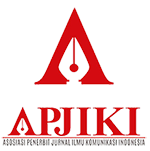LITERASI MEDIA SEBAGAI KUNCI SUKSES GENERASI DIGITAL NATIVES DI ERA DISRUPSI DIGITAL
Abstract
In the era of digital disruption, internet is a major differentiating factor in the social arena of society. The internet presents various forms of new media platforms which known as digital media or social media. Social media has become a media information and at the same time as a new employment for the community, especially for the digital natives. This generation knows the internet and social media since they were little kids and over time, they are able to change social media from just channeling a hobby to become a profitable media. This cleverness in reading business opportunities is also due to the strong foundations of media literacy that were acquired since they were young. This happened to the six students in Malang who were informants in this study. Researchers used a qualitative approach with an interpretive paradigm to be able to explore how the background of these six students in achieving profits through the social media.
Keywords
Full Text:
PDFReferences
Asosiasi Penyelenggara Jasa Internet Indonesia. 2017 (2019, November 19). Penetrasi dan Perilaku Pengguna Internet Indonesia. Diakses dari https://apjii.or.id/content/read/39/342/Hasil-Survei-Penetrasi-dan-Perilaku-Pengguna-Internet-Indonesia-2017.
Baruah, T. D. (2012). Effectiveness of Social Media as a Tool of Communication and Its Potential for Technology Enabled Connections Micro-Level Study. International Journal of Scientific and Research Publications, 2(5), 1-10.
Bulger, M. & Davison, P. (2018). The Promises, Challenges, and Futures of Media Literacy. Data and Society Research Institute.
Generasi Millenial Paling Rentan Dengan Bahaya Hoax. (2019, November 17). Diakses dari https://kominfo.go.id/content/detail/8726/generasi-millenial-paling-rentan-dengan-bahaya-hoax/0/sorotan_media.
Habibi, M. (2011). Memahami ACFTA dari Perspektif Masyarakat Jaringan. Jurnal Kajian Wilayah, 2(1), 99-149.
IDN Research Institute. Indonesia Millennial Report 2019. (2019, November 19). Diakses dari https://cdn.idntimes.com/content-documents/indonesia-millennial-report-2019-by-idn-times.pdf.
Istiana, P. (2016). Gaya Belajar dan Perilaku Digital Natives Terhadap Teknologi Digital dan Perpustakaan. Prosiding Seminar Nasional. Bandung.
Juditha, C. (2013). Tingkat Literasi Media Masyarakat di Wilayah Perbatasan Papua. Journal Communication Spectrum, 3(2). 107-120.
Kasali, R. (2017). Disruption. Jakarta: PT. Gramedia Pustaka Utama.
Kurnia, N. (Ed.). (2017). Literasi Digital Keluarga. Yogyakarta: Center for Digital Society UGM.
Manning, J. (2017) Social Media, Definition and Classes of. In K. Harvey (Ed.). Encyclopedia of Social Media and Politics. Thousands Oaks, CA: Sage.
Mardina, R. (2019, November 15). Literasi Digital Bagi Generasi Digital Natives. Diakses dari https://www.researchgate.net/publication/326972240_Literasi_Digital_bagi_Generasi_Digital_Natives.
Matzler, K. et al. (2018). The Crusade of Digital Disruption. Journal of Business Strategy. https://doi.org/10.1108/JBS-12-2017-0187.
Pendit, P.L. (2019, November 7). Digital Native, Literasi Informasi dan Media Digital. Diakses dari https://pdfs.semanticscholar.org/1ed6/53f61ce6ce178dee0cb255419d0492a92afc.pdf.
Prihatsanti, U et al (2018). Menggunakan Studi Kasus sebagai Meode Ilmiah Dalam Psikologi. Buletin Psikologi, 26(2), 126-136. DOI: 10.22146/buletinpsikologi.38895.
Rahardjo, M. (2018). Paradigma Interpretif. (2019, November 16). http://repository.uin-malang.ac.id/2437/1/2437.pdf.
Rosyidah, F. N. & Nurdin, M. F. (2018). Perilaku Menyimpang: Media Sosial Sebagai Ruang Baru Dalam Tindakan Pelecehan Seksual Remaja. Jurnal Pemikiran dan Penelitian Sosiologi, 2(2), 38-48.
Skog, D. A. et al. (2018). Digital Disruption. Business and Information System Engineering: The International Journal of Wirtscharftsinformatik. https://doi.org/10.1007/s12599-018-0550-4.
Thoman, E. & Jolis, T. (2005). Literacy for the 21st Century. Center for Media Literacy.
Wolf, M., dkk. (2019, November 15). Social Media? What Social Media?. Diakses dari https://www.ukais.org/resources/Documents/ukais%202018%20proceedings%20papers/paper_4.pdf.
Zur, O., & Walker, A. (2011). On Digital Immigrants and Digital Natives: How the Digital Divide Affects Families, Educational Institutions, and the Workplace. Diakses dari https://www.zurinstitute.com/digital_divide.html, 15 November 2019.
DOI: https://doi.org/10.32509/pustakom.v3i1.989
Refbacks
- There are currently no refbacks.
Copyright (c) 2020 JURNAL PUSTAKA KOMUNIKASI

This work is licensed under a Creative Commons Attribution-NonCommercial-ShareAlike 4.0 International License.
Indexed by:
Recommended Tools :
Jurnal Pustaka Komunikasi
Fakultas Ilmu Komunikasi, Universitas Prof. Dr. Moestopo (Beragama)
Kampus I, Jl. Hang Lekir I/8 Jakarta Pusat, Indonesia 10270
WA: 085714422271 (Chat Only)
email: pustakom@dsn.moestopo.ac.id
Copyright (c) 2025 Jurnal Pustaka Komunikasi
Licensed under a Creative Commons Attribution-ShareAlike 4.0 International License.














